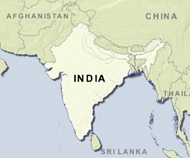New Delhi
30 October 2009
 |
| India |
The warning that inflation is rising faster than expected has come from India's Central Bank.
In a statement this week, the Central Bank said inflation could rise to six point five per cent by March next year - more than double its target of about three per cent.
Experts say Inflation is rising because a widespread drought this monsoon season affected crop production and pushed up food prices in the country. Commodity prices such as steel, which had fallen due to the global financial crisis, are rising again.
Economist P.K. Chowdhury, with domestic rating agency ICRA, says high inflation is worrisome for a country with a vast poor population.
"The daily necessities like clothing, food item etc. these are becoming very expensive for common man," said P.K. Chowdhury. "So that is a cause of anxiety. Purchasing power of the common man is not very encouraging at this point of time."
Economists say the Central Bank will soon begin repealing some of the emergency measures put in place in wake of the global financial crisis, in an effort to control inflation. As in most other countries, the government had pumped in billions of dollars, and lowered interest rates to boost consumer demand, and revive the economy.
Although interest rates have not yet been raised, some experts anticipate a rate increase early next year. So far, Australia is the only country that has raised interest rates to control inflation.
Indian industry leaders say they are concerned about the prospect of higher interest rates, saying it could impact an economy on the path to recovery.
However, economist Chowdhury says that is unlikely to happen. He says India's economy is doing better than expected, with forecasts of a rise of six per cent this year.
"What was being estimated earlier, even that has been re-estimated and revised upward," he said. "So that shows lot of positive things happening. If you look at global recession also, the signs that are coming are improvement everywhere. So that will also have a cascading effect on Indian economy."
The impact of the global financial crisis was less severe on India compared to other Asian economies because Indian industry relies more on domestic demand than exports.